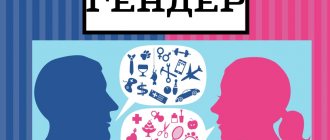A doctor knows how to distinguish a healthy person from a mentally ill person. But relatives do not always notice the “first signs”; they do not always understand in time that the norm has long ended and it is time to do something. The very fact that a loved one becomes insane is a great physical and moral test for all family members, and this sometimes makes it difficult to admit the obvious.
In this article we will talk about the most common symptoms of mental illness. Each of them separately does not always mean that a person is definitely sick. The diagnosis can only be made by a doctor. The task of loved ones is to notice in time that not everything is in order and contact a specialist.
A few years before
The first signs of schizophrenia can appear long before the disease develops. They are called outpost syndrome. Few people are able to suspect an insidious disease in them.
Such initial symptoms of schizophrenia appear several years (3–15) before the development of the disease. Characterized by asthenic manifestations, when there is rapid fatigue and the inability to maintain physical and mental activity for a long time. Sleep is disturbed, mood is unstable, self-control is lost, the person does not control his emotions and becomes irritable.
Asthenia is accompanied by apathy - powerlessness, low mood, lack of desire to perform usual actions, indifference to people and current events, decreased emotional background.
Dysphoria is also considered the first delayed symptom of the disease. This is a pathologically low mood, accompanied by irritability, dissatisfaction with one’s life and everything that happens around. There is a pronounced hostility towards other people.
Initially, it seems that such manifestations are a reaction to a certain unfavorable event. But later it becomes clear that they arise on their own.
Aggression, outbursts of anger, and a tendency to commit illegal actions are also inherent in this condition. It happens that dysphoria is accompanied by enthusiasm and elation. The person becomes overly talkative and may develop delusions of grandeur.
Typically, dysphoria lasts from several days to several weeks. Then it passes.
Naturally, the listed signs are nonspecific, and almost no one would think that they are able to predict the development of schizophrenia.
Clinical picture
Personality disorders are not accompanied by pronounced neurological symptoms, with the exception of cases when the cause of the pathology is organic brain damage. Therefore, the diagnosis is made based on the characteristics of a person’s behavior, socialization skills, and interpersonal relationships.
Depending on the clinical manifestations, there are several forms of psychopathy in men:
- asthenic;
- anancaste;
- schizoid;
- paranoid;
- dissocial;
- emotionally unstable;
- hysterical.
How does schizophrenia debut?
The disorder is considered typical of adolescence and young adulthood. However, it occurs in both older people and preschoolers. Moreover, the age at which the disease begins plays an important role in its clinical picture. The younger the patient’s age, the more malignant its course. It is known that men get the disease at an earlier age than women.
It all starts with emotional changes. A feeling of some internal discomfort, a feeling of being “out of place” is formed. Communication with others becomes more and more difficult, ease and lightness disappear, embarrassment, tension and timidity appear. Self-respect and confidence are lost. A person begins to feel like he has fallen out of society.
Autonomic reactions are possible in the form of headaches, pressure surges, increased sweating, and changes in heart rate.
Irritability appears, and the patient is increasingly accompanied by a bad mood. He cannot concentrate on performing any action, becomes absent-minded, his physical and mental productivity decreases, or a rapid change in mood occurs.
A person is increasingly in a state of tension and anxiety, expecting something bad to happen. Episodes of derealization occur - reality is perceived as something unreal. Everything seems strange, blurry, alien. Sounds become dull. Patients compare this environment with decorations. The brightness of perception is lost, and memory suffers.
Depersonalization also appears in the early stages of the disease. Patients themselves notice that something is wrong with them. They may talk about not feeling anything. The perception of one’s “I”, body proportions, age, gender is distorted.
A condition called flattened affect develops. At the same time, the brightness and expressiveness of emotions decreases. The patient's facial expressions and gestures become limited. It seems that a mask was put on the face, and the body became wooden.
A rather indicative sign is emotional coldness towards family and friends: children, spouses, but most often towards the mother. At the same time, the patient not only withdraws, but also shows anger and aggression, but adequate emotions remain in relation to people with whom they communicate less closely. A person can behave with them as before.
Inappropriate emotional reactions are observed no less often: the patient may laugh when there is no time to laugh, and in a situation when everyone is laughing, he sobs bitterly or there are no emotions at all. If previously a person could not help but smile at even the most primitive joke, now after telling a joke there will be no reaction in return.
Another series of symptoms is obsessive-compulsive symptoms. A person constantly has an obsessive idea spinning in his head. For example, the thought that he will be hit by a car if he crosses the road. Or the constant need to do everything perfectly.
Various ritual movements are necessarily present. A patient can spend 10–15 hours drawing just lines or other symbols in a notebook.
Fears are also observed in the clinical picture, but they are of a different nature than in a phobic disorder. A person talks about them calmly, unemotionally, without a shadow of intolerance on his face. Fears are illogical. For example, fear of a certain word or color.
Which doctor should I contact if I have a nervous disorder?
The best option would be a neuropsychiatrist, who to some extent combines the functions of a neurologist and a psychiatrist. If it is not possible to make an appointment with this particular specialist, contact a psychiatrist or neurologist. The first deals with things related to mood and self-awareness, the second deals with the physical manifestations of nervous disorders, such as insomnia, headaches, and concentration problems.
A psychologist and psychotherapist will help only when mental illnesses are excluded, a diagnosis is made and the main goal is to return the person to normal life.
Changes in behavior and habits
Among the external signs of schizophrenia that indicate its onset, the first to be distinguished are strange behavior. The patient withdraws into himself and withdraws from people. Can sit for hours in a closed room and lie on the bed. Signs of apathy are growing. Stereotype of movements increases.
One of the pathognomonic symptoms at the dawn of schizophrenia is paragnomena. This is a discouraging, unexpected behavior of the patient that is not typical in the normal state. For example, he cuts all his clothes into small pieces, arguing that this way he can put them in his closet more compactly.
The patient seems to go with the flow, submitting to all life circumstances, does not try to improve his existence, does not strive for achievements, to realize his plans.
A typical, characteristic sign of schizophrenia at an early stage is loss of interest in previously significant interests and hobbies. For example, a person used to be fond of cycling and rode a bicycle for several hours almost every day. Perhaps he took part in competitions. And then abruptly, for no apparent reason, he abandoned what he loved, settled at home, and isolated himself.
But he develops new passions. A fascination with the supernatural and metaphysical becomes typical. Often the subject of interest for patients is psychology, philosophy, mysticism, even if previously he was not interested in these areas at all. But most often, patients begin to get involved in religion. Scientists attribute this to the whimsicality and inconsistency of religious images and paintings, which reject and question the generally accepted norms of development of the world around us. Subsequently, these images become the subject of delusional ideas and hallucinations.
A person stops caring about anything at all. He even stops performing basic hygiene procedures: brushing his teeth, washing himself, and becomes unkempt and sloppy. His clothes are dirty, his hair is disheveled, but he doesn’t care what he looks like.
In another case, he spends an unusually long time on water procedures. For example, patients are able to spend several hours in the shower.
Strange cravings appear. The patient can go to a landfill, collect garbage and bring it home, accumulating mountains of unnecessary trash there. There may be a craving for theft and arson. But there are also pleasant changes: patients delve deeper into reading. But this is also pathological in nature, since they tend to read everything that catches their eye.
They forget about food and are able to go without food for several days. Or they come up with fancy diets, or they prefer to eat only one specific product.
Body dysmorphic disorder is a symptom that is a manifestation of many mental disorders. Including schizophrenia. A person becomes convinced that some part of the body is deformed. Too big nose, thick legs, protruding ears. In fact, these organs do not bring any resonance to his appearance.
The patient can hide his concern or, conversely, tell others, use any means to hide the “flaw”. His fixation can be detected when he stands for hours near the mirror, looking for poses in which his “flaw” is not so noticeable. He refuses to be photographed and hides his photos from others. This distorted self-perception sometimes leads to suicide attempts. That is, the patient cannot tolerate his imaginary deficiency to such an extent that he is unable to exist with it.
In general, a person is isolated from society, withdraws into himself, becomes greedy with emotions and strange in behavior.
These signs of the disease are often ignored. Or such people cause resentment among loved ones, bewilderment and irritability among other people. As a rule, people consult a doctor only in cases when the symptoms begin to blossom and hallucinations and delusions appear in the arena.
All early symptoms of schizophrenia are characterized by incompleteness, vagueness and episodicity. This causes difficulties in making a diagnosis, confusing doctors. Therefore, they are in no hurry to issue a final conclusion until typical signs appear.
Although many patients are absolutely sure that they are healthy, there are also those who imply that something is happening to them. They study information about their mental state, eventually finding a rationale for it, and are even able to make the correct diagnosis for themselves.
This is how one young man describes his medical history. It started around age 25. At first it was a pathological fixation on the mistake. If he heard a word that sounded wrong to him, he began to repeat other words starting with that letter. This allowed him to relieve tension. For a while, such a ritual even brought pleasure.
In another case, an unpleasant event, for example, a broken cup, caused him to create a sequence in his thoughts, a sequence of reverse actions: from a negative result to the beginning of the event. It also brought him joy and relieved his anxiety for a while. But if something interrupted his thoughts, he had to start again.
Each time it seemed that it would end soon. But as soon as any incident happened, everything would repeat itself. It happened that, while composing his chains, he spent 20 hours in bed or walked around the room.
Soon voices appeared, whispering unpleasant thoughts. They were so obvious that the patient felt as if they were his own. Then the sounds around me intensified. We had to wear headphones because they really irritated our hero. It happened like this: a car passed by, and he looked at it with a different look. Then you had to look again, right. There was a fear that the car would drive away and he would not complete his ritual.
During this time, he repeatedly consulted doctors until, finally, a diagnosis was made and the correct treatment was prescribed.
Emotionally unstable psychopathy
The main external sign of the disease is impulsiveness in words and actions without taking into account possible consequences, lack of self-control. Any little thing can make a person angry; sometimes outbursts of aggression and irritability arise for no reason. Usually the disease manifests itself at a relatively early age, when the child is first forced to comply with certain requirements. Gradually, the pathology progresses up to episodes of twilight stupefaction for no apparent reason.
Onset of the disease in children
Childhood schizophrenia is not common, but there are known cases of its occurrence in children as young as 2 years of age.
Here are signs that should make parents think about their child’s mental state:
- The child avoids communication with friends, becomes withdrawn, and prefers loneliness. He prefers quiet, sedentary pastimes to active, active games. Plays alone, sometimes in games invented by himself;
- refuses to perform hygiene procedures;
- the mood spoils for no reason. The child whines, is capricious for no reason;
- cannot defend himself, tries to hide from a conflict situation;
- the cognitive level is impaired. The child seems to take a step back in his development. Poorly assimilates new material and behaves according to his younger age;
- shows unmotivated aggression towards loved ones and peers, inadequate emotional reactions: if another child hits him, it hurts him, he cries, then this baby starts laughing;
- the child develops speech problems. Incomprehensible words appear, speech is scanty and abrupt.
The behavior of such children is noteworthy. For example, they pretend to be a bird. At the same time, their actions are appropriate: they imitate flight, claim that they are not a boy or a girl, but a bird, and “peck” at food.
At an older age, children call themselves by other names and communicate with imaginary friends.
In adolescence, schizophrenia manifests itself as emotional detachment. The teenager withdraws into himself and stops communicating with friends. At the initial stage of development of the disease, perverted desires appear. Children run away from home and become members of gangster groups, where they strictly obey the leader. They show aggression and sadistic tendencies. They demonstrate sexual perversions and are addicted to drugs and alcohol.
Particularly indicative is the duality of behavior. At home, the teenager behaves aggressively, laxly, argues and is rude, and rants a lot. And at school he becomes a different person: quiet, withdrawn, secretive.
As for such a severe form of the disorder as hebephrenic, at the dawn of its development such children become apathetic. Even if during the day they were not subjected to heavy mental or physical stress, they still feel overwhelmed, tired, and literally fall off their feet. They learn new material poorly. Sleep is disturbed and there is a rush of thoughts before falling asleep. Interest is lost and indifference appears. They remain inactive, abandon their studies, considering all efforts useless.
Aggression towards loved ones, especially mothers, while maintaining a normal attitude towards strangers is a very indicative symptom. Children call their parents guardians, believing that their real dad and mom are very influential and rich people. They just couldn't raise the child for some good reason, so they placed him in foster care.
An interesting fact has been established. Among children suffering from schizophrenia, the largest number are those who, before the illness, were known as obedient, flexible, problem-free children.
In childhood and adolescence, such manifestations are difficult to interpret correctly. They are usually mistaken for children's whims, the costs of upbringing, or a teenage crisis.
Find your inner masochist
As much as we want to feel good all the time, a small part of us likes pain and suffering. Because by overcoming them, we feel that our life has meaning. The most important moments in life that define us are often the most unpleasant: the proximity of death, the loss of loved ones, divorces and separations, victory in a painful battle or overcoming a difficult trial. It is through experiencing difficulties that we grow and change, and when we look back, we even feel grateful for them.
This happened to me too. I remember starting my business in 2008 and working 12, 14, 16 hours a day. I remember how I fell asleep lying with the laptop on my stomach, and in the morning I immediately went to work.
At first I worked so hard out of fear and necessity. I was broke, the economy was below par, I had nowhere to go. I lived on my friends’ couch, then my girlfriend supported me. Most months I couldn't help with rent. Sometimes I didn't have money for food. But I was determined that if I failed, it wouldn't be for lack of trying. Over time, these crazy working hours became the norm.
Then I realized that I had unintentionally developed a superpower in myself.
I remember a few years later, when my friends and I were renting a coworking house on the beach, I noticed that I was the first to get up and the last to turn off my computer at night. I worked on weekends and holidays without even knowing they were weekends and holidays. Over time it has become something that makes me proud, a part of my identity that I enjoy indulging.
Of course, workaholism has its downsides, and now I have learned to turn it on and off as needed. But I still get some kind of perverse pleasure from it and am still proud that I can work all weekend.
We all have that inner masochist. In athletes it manifests itself when they test the limits of their physical capabilities, in scientists when they obsessively analyze data, in soldiers and police officers when they risk themselves for the sake of others. When is yours? What pains do you enjoy? And how can you use this to your advantage during life’s difficulties?
Schizophrenia in the elderly
Schizophrenia in old age is also a very rare phenomenon.
The problem is that its symptoms are mistaken for senile dementia until persistent delusions and hallucinations appear. Schizophrenia in an elderly person begins to manifest itself with suspicion and fears that they want to harm him, they want to offend him. Such a patient is wary of people, usually with aggression. Assuming danger from every stranger, a person isolates himself from society, withdraws into himself and hides from the whole world. He becomes what is called a “nasty old man.”
The emotions of old people with schizophrenia are inadequate. They laugh or cry inappropriately, and their mood changes quickly. In another case, their behavior is characterized by shyness and excessive modesty. Or there is emotional dullness, lack of emotion. Speech is distorted, it is characterized by paucity of statements and confusion. Often people simply remain silent.
Episodic derealization is observed when the patient does not understand where he is, what era he lives in, and does not recognize his loved ones. Depersonalization is expressed in a lack of understanding of who one is.
A characteristic symptom is the appearance of deceased relatives, friends, and acquaintances to the patient.
In old age, the paranoid form of the disease develops more often than others.
One of the main mistakes of people with problematic mental health
This mistake is trying to completely eliminate stress from your life. Sometimes people with unstable psyches withdraw from the world around them - they quit their jobs, limit their social circle, and begin to rarely leave the house. But such a distance from reality makes the psyche even more unstable; a person cut off from life begins to see the world only in black and white, thinking loses flexibility and ultimately a prolonged depression and loss of desire to live sets in. If you begin to notice similar behavior in yourself or loved ones, you should immediately take action to prevent sad consequences.











